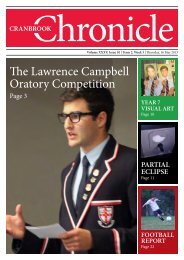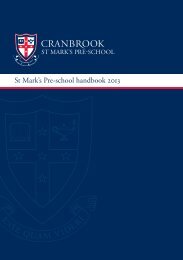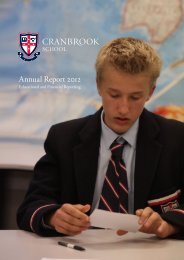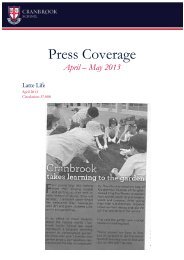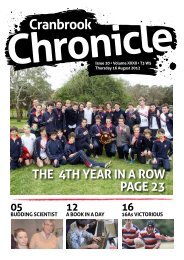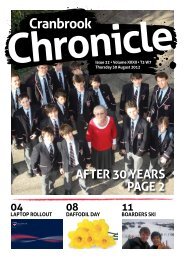View Here - Cranbrook School
View Here - Cranbrook School
View Here - Cranbrook School
Create successful ePaper yourself
Turn your PDF publications into a flip-book with our unique Google optimized e-Paper software.
Thursday, 30 May 2013 | Term 2, Week 5<br />
FEATURE<br />
The fine print<br />
by Tom Gibson and Matthew Theophile<br />
What’s in the name?<br />
Our names are something that we often take for granted, yet in many ways they influence our lives. Over the<br />
years, we have seen trends emerge in our choices of various baby names, many of which may seem strange<br />
or dated to us now. However, current trends in naming have led to some governments around the world<br />
legislating on the names people can and, more importantly, cannot call their children.<br />
Iceland has a list of approved names which<br />
must be used, although new names can be<br />
considered after an application process. In<br />
Germany, names must clearly indicate gender,<br />
(meaning that gender-neutral names like Alex<br />
and Jessie are unacceptable). In New Zealand,<br />
however, the government has released a list of<br />
names that are officially banned. The list seems<br />
to be based on somewhat tenuous criteria, as<br />
to-date, names such as Queen Victoria have<br />
been banned whilst, perversely, someone<br />
is roaming around New Zealand with the<br />
entirely legal name of Number 16 Bus Shelter.<br />
Some of these weird and wacky names can<br />
be put down to the celebrity obsession with<br />
strange names, dating back to when Frank<br />
Zappa called his daughter Moon Unit, Michael<br />
Jackson called his son Blanket and Sylvester<br />
Stallone called his daughter Sage Moonblood.<br />
Regardless of how this new phenomenon<br />
started, the question is whether governments<br />
are entitled to ban names based on their own<br />
idea of what constitutes a bad name.<br />
It certainly seems that names like ‘.’ (Full Stop)<br />
or ‘4real’, would be a hindrance to anyone<br />
who had to live with them and, after all, the<br />
government’s job is to look after the well-being<br />
of its citizens. Some people claim that such<br />
names are fine, because people can simply<br />
change them; however, this is not entirely the<br />
case. In NSW, people under the age of eighteen<br />
cannot legally change their name without<br />
the full consent of both of their parents. In<br />
New Zealand, a girl named ‘Talula Does the<br />
Hula From Hawaii’ went to court to get her<br />
name legally changed at age nine. The judge<br />
criticised the parents for giving the girl a name<br />
which acted as a social hurdle and even ‘set<br />
her up for a social disability and handicap.’<br />
Whilst it may not be illegal, it certainly<br />
seems immoral or unkind to give a child<br />
such a hindrance in life for a cheap laugh.<br />
Nevertheless, the fact that governments are<br />
beginning to restrict what we can and cannot<br />
call our children is not entirely comforting.<br />
Regardless of how this<br />
new phenomenon<br />
started, the question is<br />
whether governments<br />
are entitled to ban<br />
names based on their<br />
own idea of what<br />
constitutes a bad name.<br />
Even if these new laws are put in place in the<br />
interests of the children who bear the burden<br />
of these names, many would argue that such<br />
restrictions are a violation of our freedom in<br />
a democratic nation. Whether or not this is<br />
true, when there are twins being called Benson<br />
and Hedges, it certainly seems as if someone<br />
should be doing something about it.<br />
Whilst there’s nothing wrong with funny and<br />
outlandish names, when someone is given a<br />
name that can set them up as a social pariah,<br />
there should be laws in place to prevent it. In<br />
2009, three children were taken into social<br />
services in New Jersey, after they were named<br />
after prominent Nazis, including Adolf Hitler.<br />
Last year, the courts decided that the parents<br />
would never be able to regain access to their<br />
children (although this decision was not<br />
based solely on their actions in naming the<br />
children). Whilst it may be slightly over- the<br />
-top to separate parents from their children<br />
because of a bad name choice, New Zealand<br />
may not be doing such a bad thing in banning<br />
names that could set children up for a life of<br />
teasing and discrimination.<br />
3




